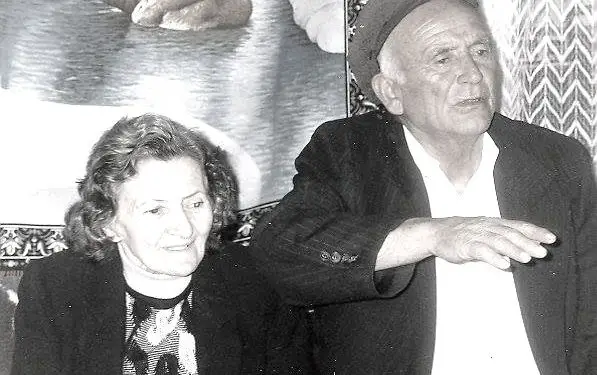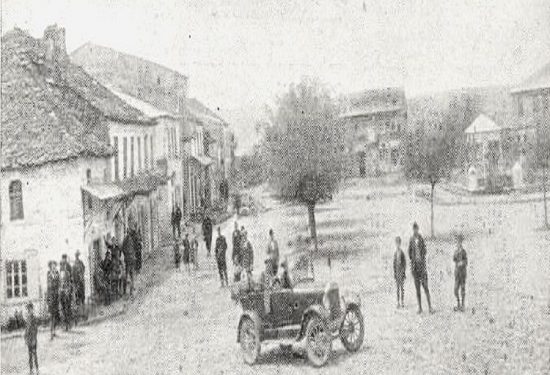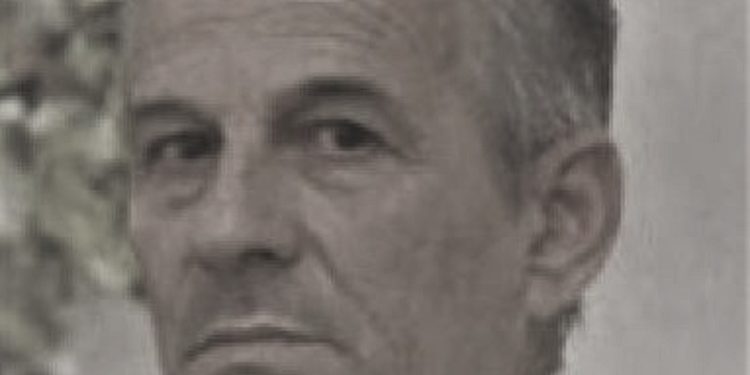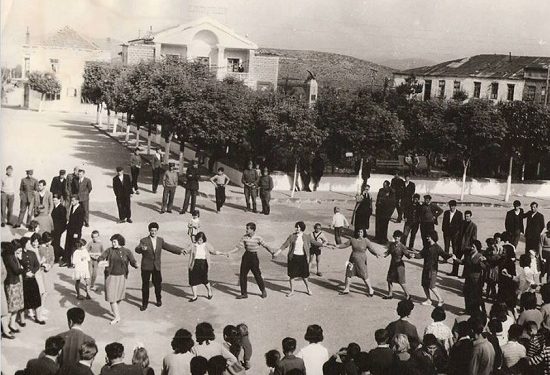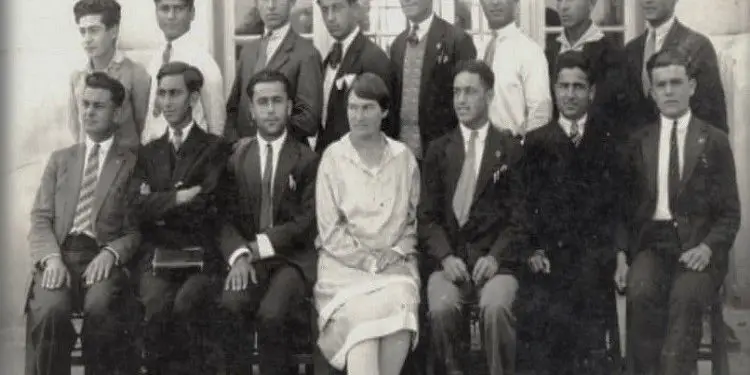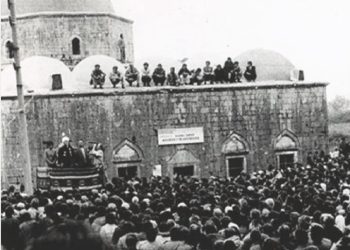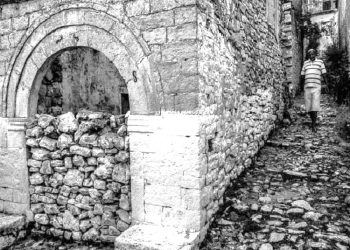From Vepror Hasani
– The persecution of the rich and aristocratic Maluka family, descendants of the founders of Erseka, friends of Ismail Qemali and Fan S. Noli-
Memorie.al / The city of Erseka is divided into several neighborhoods, one of them is the oldest. The founders of the city of Erseka, the Maluka tribe, had lived there. They were friends of Ismail Qemali and Fan S. Noli. Normally, the neighborhood of Malukaj should have been called “Old Neighborhood”, but it was never called that. It wouldn’t be too much even if it was called the ‘Neighborhood of Malukaj’, but this didn’t happen either. There was never any talk of erecting a monument or a commemorative plaque as the founder of the city. It was the time of the dictatorship. The regime aimed at the annihilation of large families. Even to this day, the neighborhood of Erseka’s ancestors is called “Farmers’ Neighborhood”. They deliberately baptized him with this name.
The people newly in power wanted to tell others that from now on, industrial cities would be born. They wanted to despise the founders of the city of Erseka, to treat them as mediocre, without knowledge, without culture, without vision, simply; as ordinary farmers and ranchers. Their disregard and denial was demanded at all costs, and all this, just because they had been rich, even very rich and educated.
The Malukas not only had cattle, lots of land, shops, villas with carved stones, but also forests and pastures. They were the most vocal merchants of the city. They were the bourgeois of Erseka, above all they were true patriots, masters of many foreign languages, from Arabic, Turkish, English and the languages of neighboring countries.
When the English traveller, Edith Durham, visited Erseka in 1904, among other things in her book, “Brenga e Balkan” she wrote: “…In the inn only Albanian was spoken. Yzbashi translated for me. Kajmekami invited me to his house, where there was a fire and you felt comfortable. Erseka is entirely Muslim and there are no more than 100 houses…”! So, in this small town, even 100 years ago, you could find people who spoke English, while only Albanian was spoken in the inn, because the town had neither Turks nor Greeks.
The Malukas had always supported Ismail Qemali and Fan S. Noli. But even though the truth had been like this, the tribe of the Malukas, removed the “olive mourning”. One of this tribe, Hysen Maluka, on the occasion of the 50th anniversary of Independence, received the ribbon of the patriot in Vlora, but his death, one of the most tragic; passed away abandoned by all.
Qazim Maluka was shot for the sole crime of being rich. Muharrem Maluka was sentenced to 12 years in prison, because he did not accept the seizure. Others, bearing this surname, experienced endless horrors and suffering. Their descendants had the same fate.
One of the big families of the city of Erseka is that of Skënder Koçi (Haxho), whose wife, Aliaj, came from the door of Malukaj. Alija was the only daughter of Qazim Qerim Maluka, who, Muharrem Qerim Maluka, had an uncle. Now the grandson of Qazim Maluka and Muharrem Maluka, Pirro Koçiu (Haxho) tells how unwanted their family was by Enver Hoxha’s regime.
Mother’s despair
“In my family,” begins Arti (Pirro) Koçiu, “there was a lot of talk about the Maluka tribe, because my mother, Alija, had left that door, but at that time I was too young to understand what was happening with my grandfather tim, Qazim Maluka and mother’s people. I only knew that they had been very rich, with properties, houses and shops. My mother told me that the place where the building was erected in front of the square (today the City Hall) had been the property of the Malukallas.
In this square, – she told me, – every Wednesday there was a bazaar. Every time he spoke to me about Maluka, I saw a drop of tear in his eye, which rose like a drop of dew on his cheekbones. He also told me that every year, from September 25-28; a fair was organized in a large square, which was the property of the Malukallas.
The mother’s voice began to yearn: she told me about the cottages that this tribe had built, about the shops, the inns and everything else. My mother liked to tell me that the Malukas were the first to settle in this place, at the foot of Gramoz Mountain.
Thanks to the great wealth they had, the Malukas employed many people to work the land, to graze cattle, to make cheese, to trade in meat and to maintain houses and shops; they paid ustallars from the best for fixing cobbled streets and building houses. They equipped the apartments with wells, so that they never lacked water. We were quite rich, my mother told me, while the tear drop on her cheekbones remained permanently frozen there”.
When I started to learn the truth
“I found out later that my mother’s father, Qazim Qerim Maluka, had been shot, while her uncle, Muharrem Qerim Maluka, had been sentenced to prison. Mother often told me, long and wide, the shooting of her father, and cried; maybe she knew that his shooting would affect our lives as well, but she never told me this. We were five children: Angel, Joy, Fatmiri, me and the little sister, Alma. Only when we grew up, we started to feel that being grandchildren of a ‘bourgeois family’ was not at all pleasant for the regime established in Albania.
The so-called ‘People’s Power’ seized the movable and immovable assets of the Malukas, imposed heavy taxes on them, that there could hardly be a merchant who could repay them. They wanted the last penny. For the grandfather, Qazim Maluka, such a practice was absurd. They were the first to come to this country and they had built everything with their own hands, from the water taps where the government taxi drivers quenched their thirst and to the cobblestones, where the State Security men went to make arrests, which they were not finished in those days.
Qazim Maluka was not spared his life, but he was not the only one shot. On the right side of Erseka, there are about 30 graves. There are the graves of those who were shot. My mother always went to her father’s grave, sat there and mourned. She did not forget her people, until the day she passed away, but I could never see her, without the tears in her eyes and the worry she could never hide”.
Our youth…!
“I finished high school, but I couldn’t go to university. The same thing happened with the elder sister, Engjëllushen, with the brothers Gëzim and Fatmir. The same thing happened with the little sister, Alma. We were doomed, to be without a future. For the people of the regime, it did not matter that Hysen Maluka had fought for the Independence of Albania, that the brothers Qazim and Muharrem Maluka had been friends of Ismail Qemali and Fan Noli!
For them, we were the descendants of a man who was shot by the Party and that was enough”, – recalls Arti (Pirro) Koçiu. It was never said by anyone that the Malukas were the founders of the city, because, according to the logic of that time, cities were founded only by the party, so the oldest neighborhood of Erseka started to be called the “Farmers’ Neighborhood”.
“Fatmiri felt the lack of the future, more than all of us. I had not yet started to feel depressed, because when I was 17 years old, I became active with the football club of my city, ‘Gramozi’. I was one of the best players on the team, but more than that. At that time, I had requests from the football club “Skënderbeu” of Korça, from “Partizani”, “Dinamo” and other clubs, but as soon as the request arrived at the Party Committee in the district, everything came to an end. I couldn’t play with the big teams. This right was not given to me even when I won the Golden Ball.
For all this, my brother, Fatmiri, was upset, but not only for me, my brothers and sisters, but also for the lack of his future. Then I began to understand why the tears in my mother’s eyes never stopped. Apparently she knew that we would have a difficult life ahead of us”!
The escape of the brother, the exile of the family
“My brother, Fatmiri, could not cope with his despair. On March 27, 1977, he was able to escape. It had first stopped in Greece and then ended up in the USA. After that, a rumble erupted over our house. Security people questioned us all: How did Fatmir come up with the idea of escaping? When did you get this idea? How did you not understand his purpose…?! The questions were endless, but we knew nothing. I was a soldier at that time”, continues Arti (Pirro) Koçiu’s narration.
“However, even though I felt depressed about what happened to us after this action of my brother, I myself never thought of escape. I admired my brother’s act. It was his right to abandon the inhuman regime reigning in the country.
It wasn’t long before a military car pulled up at our gate. They put us in the car and we headed for a long road. They took us to a remote village called ‘Shijan’. I had never been to that place that was located between the two districts; Cologne and Permet. It was an isolated place. They left us there and ran away. Someone else informed us that our house would be where the cooperative’s mules slept. It was a horse stable and nothing more.
I remember that my mother, Alija and my sisters, started to clean everything. To replace the floor, they laid it with soil (mud). There was no question of fixing the ceiling. The wind and snow blowing outside were our constant guests. With a lot of effort, we managed to isolate the spaces from where the wind and rain entered. No one was helping us. The people of the village were afraid to say good morning to us. No one approached us. We were exiled; we were required to be secluded from everyone and everything. I will never forget this.
I cannot forget that even Bashkim Zhurma (a resident of this village), while going every day with the cooperative’s mules to get supplies to the city, did not even deign to take my bag, when I happened to go to Erseke. If you will do me the honor, do not go without quoting this character. To tell you the truth, such behavior makes you feel insulted and humiliated.
We stayed at the mule stable for 5 years in a row. Finally, they sent us back to Erseke, but if even before we had been unwanted by the people’s government, this was already openly declared. Only one who has experienced the violence of the Enverian regime knows what it means to be unwanted. We were under surveillance at all times. Anyway, they activated me again with the ‘Gramozi’ team. Maybe they had nothing to do; they definitely needed me in the ‘Gramozi’ team, so that even those who had exiled us could be proud. Again, I had requests from other clubs, but now, there was no longer any such possibility”!
Parents
“My brother’s escape left a deep mark on my parents’ lives. They did not sleep peacefully at night. They kept talking about the runaway brother. They asked each other if he was alive or dead. They were not sure if he had been able to cross the border or not! The mother was always waiting for a letter to come to her, where it was written: “Mother, I’m fine, don’t worry, I’m in such and such a place”, but this letter could not come, just as her son could not come either. He would remain there, in a distant place, while his parents here…”! – Further Arti (Pirro) Koçiu tells about his parents’ worry and concern after his brother’s escape.
“All the parents were worried about was: would they see him one more time while they were alive?! They would get up in the morning and tell that Fatmiri had appeared to them in a dream. The mother said that she had spoken to him, but he had not left. He waited for the next night, so that he would appear again and tell him how he got on from where he had gone. As always, I often saw her crying. I was convinced that that night, in her dreams, Fatmiri had either been sick, or had some trouble, which she had not been able to tell her mother clearly. That’s how the years of my parents’, brothers’ and sisters’ lives flowed”!
The return of the brother after 12 years
“When the winds of Democracy started to blow, a letter from the USA arrived at our house. Fatmiri used to send it. He told us that very soon, he would come to Erseke. I have never seen my parents happier than that day. I don’t remember exactly when, but one day in 1990, Fatmiri knocked on our door. After that visit, he came many more times, but on his first visit, he had neither night nor sleep. We could not believe that he was alive and we had him in front of our eyes. Mother and father saw him in the eyes and could not get enough at first. They asked him about everything: how he managed to escape, how he arrived in America, how he was not spotted by the border guards. What if they killed you, son? – asked the mother, etc., etc.
The father told him about the years of exile, about the right to pension that they had not given him, but reserved in what he said, because he did not want to disappoint his son, whom he had not seen for almost 12 years in a row. Later, I sent him a letter, where he wrote that the Democratic Party had recognized his right to an old-age pension and would also return our properties. We are already getting rich.
After the first longing, the brother left again. In 1992, my mother passed away, two years later our father, Skenderi, also closed his eyes, but they were lucky enough to see their son while they were alive. Already for our family, greater hopes were being born. The Democratic Party has come to power.
I remember being called to the police and since that day I continue to be its employee. I never thought of my life like this. I had always worked at NSHN (State Construction Enterprise) and other enterprises, but I never thought that one day I would be a policeman.
To be a policeman then, you had to have a good biography. I did not meet the criteria. I was the grandson of Qazim and Muharrem Maluka, the founders of the city of Erseka, who were friends of Ismail Qemali, Fan S. Noli and other great patriots. I did not meet the criteria, because the Malukallars had fought for the Independence of Albania”, Arti (Pirro) Koçiu ended his confession with pain. Memorie.al




